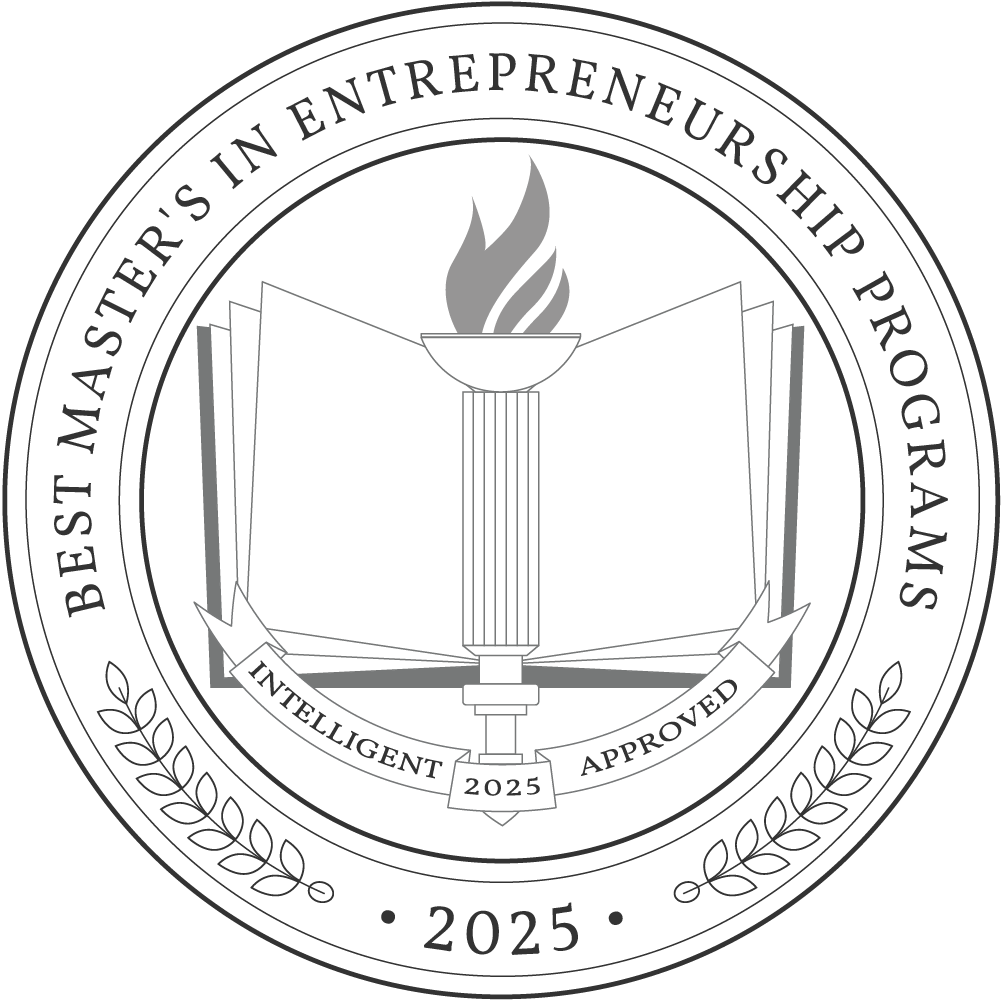A master’s in entrepreneurship equips students with a comprehensive understanding of business innovation, venture creation, and strategic management. The program covers topics such as business planning, finance, marketing, and leadership. Graduates are prepared for dynamic entrepreneurial roles, including as top executives, who make a median salary of $100,090 per year, or as management analysts, who make $95,290.
The program typically takes one to two years for full-time completion. Costs vary greatly depending on the institution chosen, but students can expect to pay an average of $12,394 at a public institution and $26,621 at a private college or university. With a focus on creativity, problem-solving, and risk management, this master’s degree cultivates the skills needed to thrive in the ever-evolving landscape of entrepreneurship.
Why Trust Us
The Intelligent.com Higher Education Team is dedicated to providing students with independent, equitable school and program rankings and well-researched resources. Our expert-driven articles cover topics related to online colleges and programs, paying for school, and career outlooks. We use data from the U.S. Department of Education’s College Scorecard, the National Center for Education Statistics, and other reputable educational and professional organizations. Our academic advisory team reviews content and verifies accuracy throughout the year for the most current information. Partnerships do not influence rankings or editorial decisions.
- Analyzed over 2,000 national, accredited, and nonprofit colleges and universities
- 800+ rankings pages are reviewed and updated yearly
- Content is informed by reputable sources, surveys, and interviews with academic advisors and other experts
- Over 100 data points are reviewed for accuracy and quality throughout the year, including sources
How we rank schools
Our list features the best Entrepreneurship degree programs at top colleges nationwide. Each school featured is a nonprofit, accredited institution — either public or private — with a high standard of academic quality for post-secondary institutions.
We evaluated each school’s program on tuition costs, admission, retention and graduation rates, faculty, reputation, and the student resources provided for online students. We collected data from trusted sources like the National Center for Education Statistics, individual school and program websites, school admissions counselors, and other data sources. Then, we calculated the Intelligent Score on a scale of 0 to 100 based on the following criterion:
Academic Quality:
- Admission rate versus enrollment rate
- Retention rate of students who return after year one
- Accreditation status (regional and programmatic)
- Nonprofit status, both private and public institutions
Graduation Rate
- Overall graduation rate
- Total number of currently enrolled students, including diversity metrics
- Student-to-faculty ratio
Cost and ROI
- In-state and out-of-state per-credit tuition rates and fees
- Required credits to graduate
- Earning potential after graduation
- Availability of federal student loans, scholarships, and other financial aid options
Student Resources
- Available student services for online-only and hybrid programs
- On-campus amenities like tutoring centers and the number of libraries
Read more about our ranking methodology.
Best 12 Accredited Master’s in Entrepreneurship Programs
FiltersInstitution Type
Status
- Intelligent Score
- Alphabetically By University Name
- Acceptance Rate
- Enrollment
- In-state Graduate Tuition
- Out-of-state Graduate Tuition
- In-state Undergraduate Tuition
- Out-of-state Undergraduate Tuition

Rice Natural Sciences
Intelligent Score: 99.85In-state: $50,310
Out-of-state: $50,310
In-state: $47,306
Out-of-state: $47,306
SAT: 1460-1570
ACT: 34-36
$1,600
On-Campus
Southern Association of Colleges and Schools Commission on Colleges
39

Texas A&M University Mays Business School
Intelligent Score: 98.83In-state: $8,395
Out-of-state: $36,849
In-state: $6,775
Out-of-state: $6,775
SAT: 1160-1380
ACT: 26-32
In-State: $868
Out-of-State: $1,410
On-Campus
Southern Association of Colleges and Schools Commission on Colleges
36

University of Pennsylvania
Intelligent Score: 97.65In-state: $53,166
Out-of-state: $53,166
In-state: $37,678
Out-of-state: $37,678
SAT: 1460-1570
ACT: 33-35
$2,323
On-Campus, Online, Blended
Middle States Commission on Higher Education
30

University of South Florida
Intelligent Score: 96.75In-state: $4,559
Out-of-state: $15,473
In-state: $8,350
Out-of-state: $8,350
SAT: 1160-1320
ACT: 25-30
In-State: $347
Out-of-State: $771
On-Campus
Southern Association of Colleges and Schools Commission on Colleges
30

UTD Naveen Jindal School of Management
Intelligent Score: 92.8In-state: $11,448
Out-of-state: $40,032
In-state: $12,028
Out-of-state: $12,028
SAT: 1210-1470
ACT: 26-33
In-State: $913 - $1,021
Out-of-State: $1,677 - $1,925
On-Campus
Southern Association of Colleges and Schools Commission on Colleges
36

University of Southern California
Intelligent Score: 91.48In-state: $59,260
Out-of-state: $59,260
In-state: $47,880
Out-of-state: $47,880
SAT: 1340-1530
ACT: 30-34
$2,307
On-Campus
Western Association of Schools and Colleges
27

UF Warrington College of Business
Intelligent Score: 90.36In-state: $4,477
Out-of-state: $25,694
In-state: $10,770
Out-of-state: $10,770
SAT: 1290-1460
ACT: 29-33
In-State: $530
Out-of-State: $1,255
On-Campus, Online, Blended
Association to Advance Collegiate Schools of Business
30

Temple University
Intelligent Score: 89.92In-state: $16,080
Out-of-state: $28,992
In-state: $16,956
Out-of-state: $16,956
SAT: N/A
ACT: N/A
$1,165
On-Campus
Association to Advance Collegiate Schools of Business
30

Lehigh University
Intelligent Score: 89.82In-state: $54,790
Out-of-state: $54,790
In-state: $27,000
Out-of-state: $27,000
SAT: 1260-1433
ACT: 29-33
$1,545
On-Campus
Middle States Commission on Higher Education
30

University of Washington Foster School of Business
Intelligent Score: 89.76In-state: $10,629
Out-of-state: $37,998
In-state: $16,278
Out-of-state: $16,278
SAT: 1200-1453
ACT: 27-33
Resident: $687
Non-Resident: $1,013
On-Campus
Northwest Commission on Colleges and Universities
46

University of Rochester
Intelligent Score: 89.73In-state: $57,188
Out-of-state: $57,188
In-state: $49,792
Out-of-state: $49,792
SAT: 1330-1510
ACT: 30-34
$2,000
On-Campus
Middle States Commission on Higher Education
32-33

Syracuse University Whitman School of Management
Intelligent Score: 88.49In-state: $53,432
Out-of-state: $53,432
In-state: $40,392
Out-of-state: $40,392
SAT: N/A
ACT: N/A
$1,872
On-Campus
Middle States Commission on Higher Education
30
How to Choose a Master’s Degree in Entrepreneurship Program
Choose your area of study
Choosing an area of study for a master’s in entrepreneurship involves aligning personal interests and career goals within the business landscape. Your concentration options may include startup management, social entrepreneurship, or innovation strategy. Reflect on your passion, whether it’s creating innovative products, fostering sustainable ventures, or optimizing business processes. Research each specialization’s curriculum, faculty expertise, and industry relevance. Evaluate the demand for entrepreneurial skills in specific sectors. By selecting an area of study that resonates with your professional aspirations, you may be able to tailor your master’s in entrepreneurship experience, positioning yourself for success in a niche aligned with your skills and interests.
Research schools and programs
Researching master’s in entrepreneurship programs involves a comprehensive approach. Evaluate program accreditation, faculty expertise, and industry connections. Utilize reputable ranking sources to gauge program excellence. Investigate class sizes, internship opportunities, and available resources. If you can connect with current students or alumni, you may learn more about their experiences in the program. Scrutinize admission requirements, including standardized test expectations. Explore unique features like workshops, mentorship programs, or incubators. Investigate the success stories of ventures launched by alumni. Thorough research ensures that prospective students make informed decisions, selecting a program that aligns with their entrepreneurial aspirations and provides a robust foundation for success.
Prepare for tests and applications
Prepare for a master’s in entrepreneurship program by excelling in any standardized tests that are required by your chosen institution, such as the GRE or GMAT. Craft a compelling personal statement outlining your entrepreneurial goals, experiences, and unique perspectives. Secure strong letters of recommendation highlighting your academic and professional capabilities. Familiarize yourself with specific admission requirements for each program, ensuring the timely submission of necessary documents. Tailor your application materials to showcase your alignment with the program’s entrepreneurial focus. If required, practice for interviews and engage with admissions counselors for insights.
Select your program
Selecting a master’s in entrepreneurship program involves aligning your aspirations with program offerings. Evaluate concentrations, faculty expertise, and industry connections. Consider program formats — online or on-campus— based on your learning preferences. Investigate internship opportunities, practical experiences, and unique features like startup incubators or mentorship programs. Assess factors like class sizes, alumni networks, and the program’s overall reputation. Ensure the curriculum resonates with your entrepreneurial goals, whether it’s launching startups, innovating within existing organizations, or fostering social entrepreneurship. By selecting a program that offers a tailored and comprehensive entrepreneurial education, you position yourself for success in this field.
Determine how you’ll pay for your degree
Determine how to fund your master’s in entrepreneurship by creating a comprehensive financial plan. Your first step should be to fill out the Free Application for Federal Student Aid (FAFSA). Explore scholarships, grants, and assistantships offered by the institution. Assess tuition costs and factor in additional expenses like textbooks or startup venture costs. Engage with financial aid offices for guidance on merit-based aid opportunities and potential loans. Consider part-time work or internships in entrepreneurial roles to supplement income. Thoroughly examine your funding options and create a detailed budget, ensuring a well-rounded financial strategy to support your entrepreneurial journey without compromising financial stability during your master’s degree program.
What Can You Expect From a Master’s Degree in Entrepreneurship Program
A master’s in entrepreneurship program offers a dynamic educational experience, encompassing the skills and knowledge necessary for venturing into the business world. Students learn to develop business plans, analyze markets, and create innovative strategies for startup success. Additionally, aspiring entrepreneurs gain insights into financial management, risk assessment, and the practical aspects of launching and managing a business.
The program typically takes one to two years for full-time completion, allowing for a deep dive into entrepreneurial principles. Some programs may include real-world projects, internships, or networking opportunities with industry experts. Prospective students should also consider any residency requirements, unique features, or collaborative opportunities, ensuring a comprehensive understanding of entrepreneurship’s multifaceted landscape.
Potential courses you’ll take in a master’s degree in entrepreneurship program
- Entrepreneurial Strategy and Innovation: This course explores the strategic aspects of entrepreneurship, emphasizing innovation, competitive positioning, and sustainable growth. Students analyze case studies, formulate business strategies, and learn to navigate the evolving landscape of entrepreneurial ventures.
- Venture Capital and Financing Entrepreneurial Ventures: Covering the intricacies of funding startups, this course delves into venture capital, angel investing, and crowdfunding. Students learn to evaluate financial structures, pitch to investors, and make strategic financial decisions critical for entrepreneurial success.
- Marketing for Entrepreneurs: Focused on marketing strategies tailored to startups, this course delves into market research, branding, and digital marketing. Students develop skills in creating effective marketing plans to launch and promote their entrepreneurial ventures.
- Legal Aspects of Entrepreneurship: Addressing the legal considerations of startups, this course covers intellectual property, contracts, and regulatory compliance. Students gain insights into navigating legal challenges, protecting intellectual assets, and ensuring legal compliance in entrepreneurial endeavors.
- Strategic Leadership and Decision Making: Emphasizing leadership in the entrepreneurial context, this course explores decision-making processes, team dynamics, and ethical leadership. Students develop the skills needed to lead and inspire teams, fostering effective and ethical entrepreneurship.
Master’s in Entrepreneurship Degree Frequently Asked Questions
How do I apply to a master's in entrepreneurship degree program?
Begin by researching admission requirements for each institution. Prepare for and excel in required standardized tests, such as the GRE or GMAT. Craft a compelling personal statement outlining your entrepreneurial goals, experiences, and unique perspectives. Secure strong letters of recommendation highlighting your academic and professional capabilities. Familiarize yourself with specific application deadlines and submit all necessary documents, including transcripts and a detailed resume showcasing relevant experiences. Tailor your application materials to each institution, emphasizing your alignment with their program. If necessary, practice for interviews and engage with admissions counselors for insights, showcasing your passion and readiness for entrepreneurial studies.
How much does a master's in entrepreneurship degree cost?
According to the National Center for Education Statistics (NCES), the cost of a master’s in entrepreneurship varies. Public institutions typically range from $9,000 to $14,000 per year, while private nonprofit institutions tend to cost between $14,000 to $43,000. These figures encompass tuition and required fees. However, additional expenses like textbooks, materials, and potential startup ventures are not included. Prospective students should consult specific institutions for precise cost details, as these figures serve as general averages and may vary based on factors such as residency status and program specifics.
How long does it take to earn a master's in entrepreneurship degree?
Generally, a master’s degree program in entrepreneurship takes one to two years of full-time study. The program’s flexibility may allow part-time options, extending completion timelines. Most graduate programs include 30 to 45 credit hours, which may also impact the time it will take to complete the program. Some programs may include internships or collaborative projects, influencing the overall length. The intensity of coursework and individual pacing also impact completion times. Prospective students should consider these factors when evaluating the time commitment required for a master’s in entrepreneurship, balancing a comprehensive education with practical experience.

